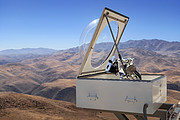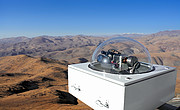Anúncio
O HARPS vê a luz do Sol pela primeira vez
17 de Maio de 2018
Em abril de 2018, uma equipa composta por cientistas e engenheiros do ESO e do Observatório de Genebra, na Suíça, deslocou-se ao Observatório de La Silla para pôr em funcionamento o HELIOS (HARPS Experiment for Light Integrated Over the Sun) [1]. Este instrumento inovador foi construído ao abrigo de um acordo entre o ESO, a Universidade de Genebra e o Centro de Astrofísica da Universidade do Porto [2].
O HELIOS é um telescópio solar que envia luz ao instrumento HARPS (High Accuracy Radial velocity Planet Searcher), montado no telescópio 3,6 metros do ESO. O HARPS é um dos caçadores de exoplanetas mais poderosos em existência e passa a maioria das noites a monitorizar estrelas à procura de minúsculos sinais que indiquem a presença de um exoplaneta. O HARPS apresenta uma precisão sem precedentes e gera regularmente resultados que constituirão verdadeiros desafios para os futuros telescópios, como por exemplo o Extremely Large Telescope do ESO.
O HELIOS será capaz de “alimentar” o HARPS com luz solar, o que permitirá realizar espectroscopia de alta precisão durante várias horas por dia [3]. Para além de nos ensinar mais sobre o Sol propriamente dito e, em particular, de fazer aumentar a nossa compreensão da atividade estelar (que é a principal limitação na deteção de exoplanetas do tipo da Terra com o HARPS), o projeto HELIOS levará a uma melhoria das técnicas de deteção de exoplanetas.
A enorme quantidade de dados obtidos pelo HELIOS levará à realização de investigação muito detalhada relativa aos diferentes efeitos instrumentais do HARPS e poderá também levar a melhorias na precisão do próprio HARPS. Esta informação poderá ser transferida e aplicada ao ESPRESSO (Echelle SPectrograph for Rocky Exoplanet and Stable Spectroscopic Observations), o sucessor do HARPS, montado no Very Large Telescope do ESO.
O projeto HELIOS decorrerá até ao final de 2022.
Notas
[1] A equipa era composta por Xavier Dumusque (Investigador Principal, Genebra), Pedro Figueira (co-Investigador Principal, ESO), François Wildi (engenheiro de sistemas, Genebra), Gaspare LoCurto (ESO), Thibault Pirson e Thibault Wildi (estudantes de engenharia).
[2] O projeto é liderado pela Universidade de Genebra, através do seu Observatório, e inclui como parceiro o Centro de Astrofísica da Universidade do Porto, através do Instituto de Astrofísica e Ciências do Espaço.
[3] A infraestrutura observacional HELIOS consiste numa lente que foca uma imagem do Sol numa esfera integrada. A radiação sai da esfera por uma fibra óptica de 30 metros ligada à unidade de calibração do HARPS. Todo o aparato encontra-se dentro de uma caixa resistente ao clima e à prova de água, encimada por uma cúpula de acrílico.
Links
- Informação adicional sobre o HARPS
Contactos
Xavier Dumusque
HELIOS Principal Investigator
University of Geneva
Geneva, Suíça
Email: Xavier.Dumusque@unige.ch
Richard Hook
ESO Public Information Officer
Garching bei München, Alemanha
Tel: +49 89 3200 6655
Telm: +49 151 1537 3591
Email: rhook@eso.org
Sobre o anúncio
| Id: | ann18033 |




